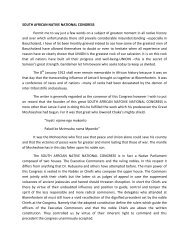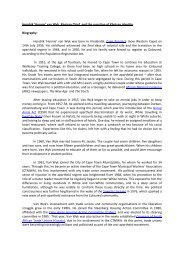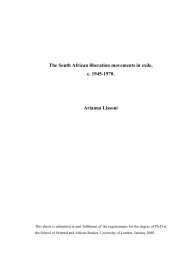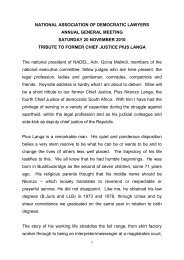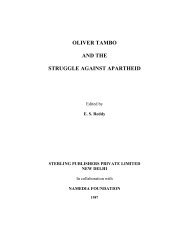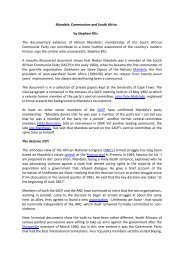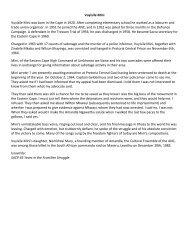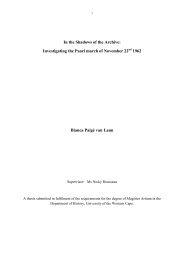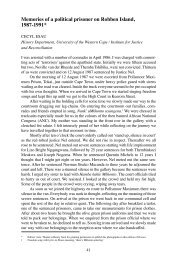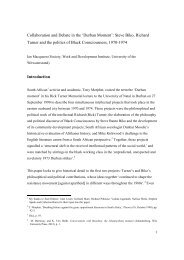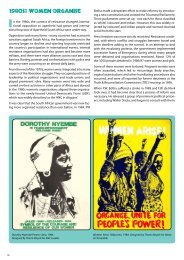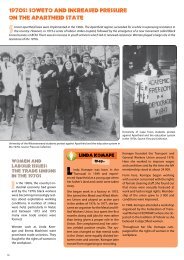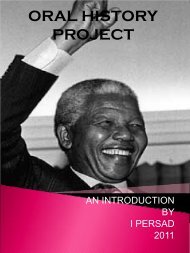Celebrating Women - South African History Online
Celebrating Women - South African History Online
Celebrating Women - South African History Online
You also want an ePaper? Increase the reach of your titles
YUMPU automatically turns print PDFs into web optimized ePapers that Google loves.
Introduction<br />
t<br />
he struggle for democracy and gender equality is built on the foundation of struggles by generations of<br />
women and men. This booklet examines the women’s struggle from the 1950s onwards, with a particular<br />
focus on the 1970s to present day. Great leaders and activists emerged in the 20th century. Many women<br />
worked hard over long periods at great cost to themselves to help our country to gain freedom from Apartheid.<br />
The profiles of the people in this booklet should encourage us to engage with the heroes of our past to inspire<br />
a new generation of women and gender activists to continue the struggle for equality and social justice.<br />
Struggle is not easy. As you will see when you read about women from the past, struggle requires service,<br />
commitment, self-sacrifice and even suffering.<br />
Decade of the <strong>Women</strong>: 1950s<br />
In the 1950s the <strong>Women</strong>’s Struggle in <strong>South</strong> Africa gained momentum. On 26 June 1955 thousands of women<br />
delegates joined men from all across <strong>South</strong> Africa at the Congress of the People to draw up the Freedom Charter.<br />
For the first time in the history of the country a multiracial gathering of men and women agreed on racial<br />
equality, human rights and gender equality.<br />
One year later, on 9 August 1956 the militant cry of thousands of black and white women rang out across the<br />
grounds of the Union Buildings in Pretoria. They had marched to the seat of the Apartheid government to<br />
protest against the hated pass laws and to demand equal rights for all <strong>South</strong> <strong>African</strong>s. They marched singing a<br />
song that has become a ‘battle cry’ of the <strong>Women</strong>’s Movement ever since.<br />
“Strijdom wathint’ abafazi, wathint’ Imbokotho”<br />
(Strijdom you’ve tampered with the women, you’ve knocked against a rock).<br />
The <strong>Women</strong>’s Anti-Pass Campaign and the <strong>Women</strong>’s Charter became the inspiration and benchmark around<br />
which decades of women struggled openly, underground and in exile until the realization of our democracy<br />
in 1994.<br />
The demands of women for equality have been written into the <strong>South</strong> <strong>African</strong> Constitution. However, many<br />
challenges still face <strong>South</strong> <strong>African</strong> women today; the main challenges include HIV/AIDS, poverty, and lack of<br />
education, unemployment and violence against women. <strong>Women</strong>’s voices must be heard at all levels of our political<br />
and social lives. The establishment of grass roots organisations and effective research projects will help<br />
to ensure that the challenge is met.<br />
The 100 year struggle for freedom and<br />
the ANC <strong>Women</strong>’s League<br />
This booklet was produced by <strong>South</strong> <strong>African</strong> <strong>History</strong> <strong>Online</strong> (SAHO). It forms part of an online<br />
archive on the role of women over a century of struggle, this is important at this time because<br />
the <strong>African</strong> National Congress (ANC) is about to celebrate its 100th anniversary (2012). It is, without<br />
question, a momentous occasion in <strong>South</strong> <strong>African</strong> and <strong>African</strong> history. But, the history of the<br />
ANC cannot be separated from the history of a multi-layered liberation struggle. So it is important that we teach about<br />
the role that women played as an integral part of our ‘struggle history’<br />
In commemoration of the ANC’s 100th anniversary this booklet includes a ‘Wall of Remembrance’ that highlights some<br />
of the key women who have played an important role in the 100 year struggle for freedom.<br />
Did you know<br />
When the <strong>African</strong> National Congress (ANC) was formed in 1912, it did not accept women as members. At the ANC’s<br />
1943 conference women were accepted as members. In 1948 the ANC <strong>Women</strong>’s League (ANCWL) was formed. The first<br />
official president of the ANCWL was Ida Mntwana who was appointed after the brief presidency of Madie Hall-Xuma.



